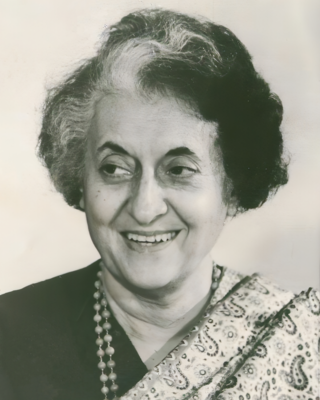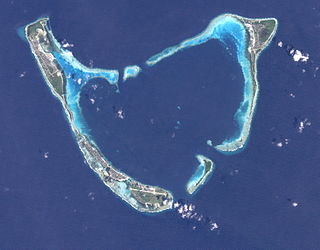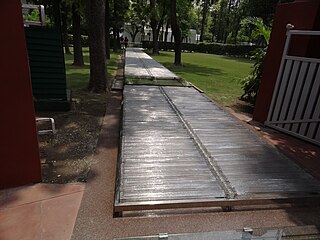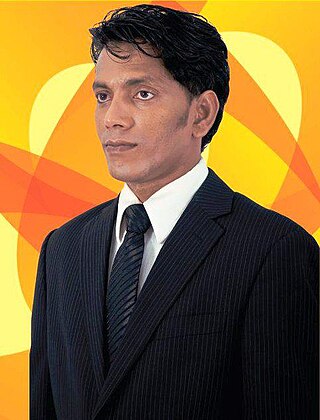Related Research Articles

Indira Priyadarshini Gandhi was an Indian politician and stateswoman who was Prime Minister of India from 1966 to 1977 and again from 1980 until her assassination in 1984. She was India's first and, to date, only female prime minister, and a central figure in Indian politics as the leader of the Indian National Congress (INC). She was the daughter of Jawaharlal Nehru, the first prime minister of India, and the mother of Rajiv Gandhi, who succeeded her in office as the country's sixth prime minister. Gandhi's cumulative tenure of 15 years and 350 days makes her the second-longest-serving Indian prime minister after her father. Henry Kissinger described her as an "Iron Lady", a nickname that became associated with her tough personality.

Feroze Jehangir Gandhi was an Indian freedom fighter, politician and journalist. He served as a member of the provincial parliament between 1950 and 1952, and later a member of the Lok Sabha, the Lower house of Indian parliament. He published The National Herald and The Navjivan newspapers. His wife, Indira Gandhi, and their elder son Rajiv Gandhi were both prime ministers of India. He was a member of Indian National Congress.
Addu City is a city in Maldives that consists of the inhabited islands of Addu Atoll, the southernmost atoll of the archipelago. Addu City is the second-largest urban area in Maldives, in terms of population, and is one of the two urban areas to get the status of "city" other than the capital city, Malé, and Fuvahmulah. Addu City has 6 districts. They are Hithadhoo, Maradhoo-Feydhoo, Maradhoo, Feydhoo, Hulhudhoo and Meedhoo. These divisions are naturally islands, but are well connected. In addition, Addu Atoll has other uninhabited islands.

Hithadhoo is a district of Addu City, in the Maldives. Hithadhoo is the main administrative district of Addu City, with many of the administrative buildings in this district. The town is situated on the island of the same name, the westernmost of Addu Atoll. In terms of population, Hithadhoo is home to the largest population in Addu City. According to the 2014 Census, with 11,129 residents, Hithadhoo also has the largest population of any administrative island in Maldives, a category that excludes the much larger national capital, Malé.

Addu Atoll, also known as Seenu Atoll, is the southernmost atoll of the Maldives. Addu Atoll, together with Fuvahmulah, located 40 km north of Addu Atoll, extend the Maldives into the Southern Hemisphere. Addu Atoll is located 540 km south of Malé, the country's capital. Administratively, Addu Atoll is the location of Addu City, one of the four cities of the Maldives. Addu City consists of the inhabited areas of Addu Atoll, namely the natural islands of Hulhudhoo, Meedhoo, Maradhoo, Feydhoo, and Hithadhoo.. In addition to the areas that are included as a part of Addu City, Addu Atoll has a number of other inhabited and uninhabited islands, including the island of Gan, where Gan International Airport is located.

Gnaviyani Atoll is one of the administrative divisions of the Maldives corresponding to the natural atoll, Fuvahmulah. Surfacewise this is the smallest administrative unit in the Maldives, situated on the Equatorial Channel between Huvadhu Atoll and Addu Atoll.
The Indira Gandhi Memorial Hospital is a state-owned Multi-Speciality hospital, and one of four hospitals in Malé, Republic of Maldives. The hospital is located at the west end of Malé. The hospital is a gift from the Indian Government and is dedicated to Indira Gandhi. It is the largest government healthcare facility, providing tertiary level healthcare in the Maldives. Located in the capital city Male’, with approximately 300 beds, IGMH provides services to around 150,000 people living in the city, plus specialist referral services for patients both domestic and foreign. Along with specialist consultations, IGMH houses investigative and imaging technologies in diagnostics. It fully covered by Aasandha social healthcare insurance.

The United Suvadive Republic was a short-lived breakaway state from the Sultanate of Maldives between 1958 and 1963, consisting of the three southern atolls of the Maldive archipelago: Addu Atoll, Huvadhu Atoll and Fuvahmulah. The first president of the new nation was Abdulla Afeef Didi. The secession occurred in the context of the struggle of the Maldives’ emergence as a modern nation. The United Suvadive Republic inherited a Westminster system of governance cloned from the United Kingdom, along with other institutional structures.
The Indira Gandhi Prize, or the Indira Gandhi Peace Prize, also known as Indira Gandhi Prize for Peace, Disarmament and Development, is the prestigious award accorded annually by Indira Gandhi Memorial Trust to individuals or organisations in recognition of creative efforts toward promoting international peace, development and a new international economic order; ensuring that scientific discoveries are used for the larger good of humanity, and enlarging the scope of freedom. The prize carries a cash award of 2.5 million Indian rupees and a citation. A written work, in order to be eligible for consideration, should have been published. The panel constituted by the Indira Gandhi Memorial Trust consists of prominent national and international personalities including previous recipients. The recipients are chosen from a pool of national and international nominees.
Addu Kandu, Dv. for "Addu Channel", is the traditional name of the broad channel between Huvadhu Atoll and Addu Atoll in the south of Maldives.

Indian prime minister Indira Gandhi was assassinated at 9:30 a.m. on 31 October 1984 at her residence in Safdarjung Road, New Delhi. She was killed by her Sikh bodyguards, Satwant Singh and Beant Singh, in the aftermath of Operation Blue Star by the Indian Army between 1 and 8 June 1984 on the orders of Gandhi. The military operation was to remove Sikh militant Jarnail Singh Bhindranwale and other Sikh separatists from the Golden Temple of Harmandir Sahib in Amritsar, Punjab, the holiest site of Sikhism. The military action resulted in the death of many pilgrims as well as damage to the Akal Takht and the destruction of the Sikh Reference Library.
There are broad channels between the Atolls of the Maldives known locally as 'kandu'. The deepness and broadness of the channels vary from channel to channel.
Mulah Kandu, Dv. for "Mulah Channel", is the channel between Fuvahmulah and Addu Atoll.

The 17th SAARC summit was held on November 10, 2011, in the South Province of Maldives. The theme of the summit was “Building Bridges”. The chairman of the summit was Maldivian President, Mohamed Nasheed. The summit was held at the Equatorial Convention Centre.

Equatorial Convention Centre (ECC) was a convention centre located in Hithadhoo, Addu City of Maldives. It was specially built for the seventeenth SAARC summit which was held in November 2011 in Addu City and nearby Fuvahmulah island. ECC was formally opened by the President of the Maldives Mohamed Nasheed on November 10, 2011.

Abdulla Sodiq was the first mayor of Addu City, Maldives. He was elected mayor in February 2011 for a three-year term as mandated by the newly instated Decentralization Act. He was reelected on February 1, 2014. His tenure ended in 2021 and succeeded by the current mayor Ali Nizar.
Indira Gandhi Government Medical College & Hospital(IGGMCH), established in 1968, is located in Central Nagpur. run by the Government of Maharashtra. It is one of the Three Government Medical Colleges in Nagpur city. The other Government Medical College in Nagpur city is Government Medical College (Nagpur), and All India Institute of Medical Sciences, Nagpur

The Human Rights Measurement Initiative finds that Maldives is fulfilling 72.0% of what it should be fulfilling for the right to health based on its level of income. When looking at the right to health with respect to children, Maldives achieves 98.0% of what is expected based on its current income. In regards to the right to health amongst the adult population, the country achieves 99.7% of what is expected based on the nation's level of income. Maldives falls into the "very bad" category when evaluating the right to reproductive health because the nation is fulfilling only 18.2% of what the nation is expected to achieve based on the resources (income) it has available.
References
- ↑ "Indira Gandhi Memorial Hospital". IGMH. Retrieved April 12, 2020.
- ↑ Ali, Humaam (3 September 2019). "Addu Equatorial Hospital handed over to government". raajje.mv. Archived from the original on 17 October 2023. Retrieved 17 October 2023.